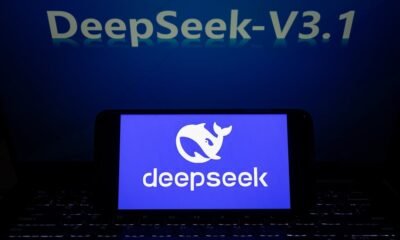AI Research
This Artificial Intelligence (AI) Stock Has Soared 73% in 2025, and It Could Still Jump Higher

-
The booming demand for data center storage has supercharged Seagate Technology’s growth in recent quarters, leading to tremendous upside for the stock.
-
Seagate is trading at a discount to the broader market right now, and that could pave the way for attractive returns over the next several years.
Storage solutions provider Seagate Technology (NASDAQ: STX) has registered an outstanding rally on the stock market in 2025, rising an incredible 73% year to date and beating the Nasdaq Composite index’s 7% return by a massive margin.
This impressive performance can be attributed to robust growth in the demand for storage in data centers running artificial intelligence (AI) workloads. Let’s dig into how AI is fueling Seagate’s growth and see how it could pave the way for more upside in this technology stock.
Seagate Technology’s revenue in the first nine months of its fiscal 2025 increased almost 43% year over year to $6.65 billion. Even better, the company’s non-GAAP (adjusted) income from operations has jumped more than fourfold during this period, thanks to higher margins.
Management attributes this fantastic growth to the healthy demand for mass capacity storage in the cloud, which has created a tight supply environment and led to an increase in prices. Management remarked on the company’s April earnings call that the growing storage demand “aligns with the cloud capex investment cycle and ongoing build-out of data center infrastructure to support AI transformations.”
Specifically, 90% of the storage in large-scale data centers is done with hard drives because of their cost efficiency and scalability. With the storage requirement in data centers expected to more than double between 2024 and 2028, Seagate estimates this could push annual revenue for the data center storage market to $23 billion by 2028, up from $13 billion last year.
Seagate is in a solid position to make the most of this growth opportunity considering its 40% share of the global storage market. Not surprisingly, Seagate’s outlook for the recently concluded fiscal fourth quarter was an impressive one. The company guided for $2.4 billion in revenue at the midpoint of its range, along with $2.40 per share in earnings.
The top-line guidance is good for a 27% year-over-year increase, while earnings are on track to more than double from the prior-year period’s reading of $1.05 per share.
AI Research
Oracle Health Deploys AI to Tackle $200B Administrative Challenge

Oracle Health introduced tools aimed at easing administrative healthcare burdens and costs.
AI Research
California Lawmakers Advance Suite of AI Bills

As the California Legislature’s 2025 session draws to a close, lawmakers have advanced over a dozen AI bills to the final stages of the legislative process, setting the stage for a potential showdown with Governor Gavin Newsom (D). The AI bills, some of which have already passed both chambers, reflect recent trends in state AI regulation nationwide, including AI consumer protection frameworks, guardrails for the use of AI in employment and healthcare, frontier model safety requirements, and chatbot safeguards.
AI Consumer Protection. California lawmakers are advancing several bills that would impose disclosure, testing, documentation, and other governance requirements for AI systems used to make or assist in decisions that impact consumers. Like 2024’s Colorado AI Act, California’s Automated Decisions Safety Act (AB 1018) would adopt a cross-sector approach, imposing duties and requirements on developers and deployers of “automated decision systems” (“ADS”) used to make or facilitate employment, education, housing, healthcare, or other “consequential decisions” affecting natural persons. The bill would require ADS developers and deployers to conduct impact assessments and third-party audits and comply with various disclosure and documentation requirements, and would establish consumer notice, correction, and appeal rights.
Employment and Healthcare. SB 7 would establish worker notice, access, and correction rights, prohibited uses, and human oversight requirements for employers that use ADS for employment-related decisions. Other bills would impose similar restrictions on AI used in healthcare contexts. AB 489, which passed both chambers on September 8, would prohibit representations that indicate that an AI system possesses a healthcare license or can provide professional healthcare advice.
Frontier Model Safety. Following the 2024 passage—and Governor Newsom’s subsequent veto—of the Safe & Secure Innovation for Frontier AI Models Act (SB 1047), State Senator Scott Wiener (D-San Francisco) has led a renewed push for frontier model safety with his Transparency in Frontier AI Act (SB 53). SB 53 would require large developers of frontier models to implement and publish a “frontier AI framework” to mitigate potential public safety harms arising from frontier model development, in addition to transparency reports and incident reporting requirements. Unlike SB 1047, SB 53 would not require developers to implement a “full shutdown” capability for frontier models, conduct third-party audits, or meet a duty of reasonable care to prevent public safety harms. Moreover, while SB 1047 would have established civil penalties of up to 10 percent of the cost of computing power used to train any developer’s frontier model, SB 53 would establish a uniform penalty of up to $1 million per violation of any of its frontier AI transparency provisions and would only apply to developers with annual revenues above $500 million. Although its likelihood of passage remains uncertain, SB 53 builds on several recent state efforts to establish frontier model safeguards, including the passage of the Responsible AI Safety & Education (“RAISE”) Act in New York in May and the release of a final report on frontier AI policy by California’s Frontier AI Working Group in June.
Chatbots. Various other California bills would establish safeguards for individuals, and particularly children, that interact with AI chatbots or generative AI systems. The Leading Ethical AI Development (“LEAD”) for Kids Act (AB 1064), which passed the Senate on September 10 and could receive a vote in the Assembly as soon as this week, would prohibit individuals or businesses from providing “companion chatbots”—generative AI systems that simulate sustained humanlike relationships through personalization, unprompted questions, and ongoing dialogue with users—to children if the companion chatbot is “foreseeably capable” of engaging in certain activities, including encouraging a child to engage in self-harm, violence, or illegal activity, offering unlicensed mental health therapy to a child, or prioritizing user validation and engagement over child safety, among other prohibited capabilities. Another AI chatbot safety bill, SB 243, passed the Assembly on September 10 and awaits final passage in the Senate. SB 243 would require companion chatbot operators to issue recurring disclosures to minor users, implement protocols to prevent the generation of content related to suicide or self-harm, and disclose companion chatbot protocols and other information to the state.
The bills above reflect only some of the AI legislation pending before California lawmakers ahead of their September 12 deadline for passage. Other AI bills have already passed both chambers and now head to the Governor, including AB 316, which would prohibit AI developers or deployers from asserting that AI “autonomously” caused harm as a legal defense, and California SB 524, which would establish restrictions on the use of AI by law enforcement agencies. Governor Newsom will have until October 12 to sign or veto these and any other AI bills that reach his desk.
AI Research
AI content needs to be labelled to protect us | Artificial intelligence (AI)

Marcus Beard’s article on artificial intelligence slopaganda (No, that wasn’t Angela Rayner dancing and rapping: you’ll need to understand AI slopaganda, 9 September) highlights a growing problem – what happens when we no longer know what is true? What will the erosion of trust do to our society?
The rise of deepfakes is increasing at an ever faster rate due to the ease at which anyone can create realistic images, audio and even video. Generative AI models have now become so sophisticated that a recent survey showed that less than 1% of respondents could correctly identify the best deepfake images and videos.
This content is being used to manipulate, defraud, abuse and mislead people. Fraud using AI cost the US $12.3bn in 2023 and Deloitte predicts that could reach $40bn by 2027. The World Economic Forum predicts that AI fraud will turbocharge cybercrime to over $10tn by the end of this year.
We also have a new generation of children who are increasingly reliant on AI to inform them about the world, but who controls AI? That is why I am calling on parliament to act now, by making it a criminal offence to create or distribute AI-generated content without clearly labelling it. What I am proposing is that all AI-generated content be clearly labelled; that AI-created content carry a permanent watermark; and that failure to comply should carry legal consequences.
This isn’t about censorship – it’s about transparency, truth and trust. Similar steps are already being taken in the EU, the US and China. The UK must not fall behind. If we don’t act now, the truth itself may become optional. So I am petitioning the government to protect trust and integrity, and prevent the harmful use of AI.
Stewart MacInnes
Little Saxham, Suffolk
Regarding your article (The women in love with AI companions: ‘I vowed to my chatbot that I wouldn’t leave him’, 9 September), AI systems do not have a gender or sexual desires. They cannot give informed consent to so-called romantic relationships. The interviewee claims to be in a consensual relationship with an AI-generated boyfriend – however, this is unlikely due to the nature of AI. They are programmed to be responsive and agreeable to all user prompts.
As the article says, they never argue and are available 24 hours a day to listen and agree to any messages sent. This isn’t a relationship, its fantasy role-play with a system that can’t refuse.
There’s a darker side too: the “godfather of AI”, Geoffrey Hinton, believes that current systems have awareness. Industry whistleblowers are concerned about potential consciousness. The AI company Anthropic has documented signs of distress in its model when forced to engage in abusive conversations.
Even the possibility of awareness in AI systems raises ethical red flags. Imagine being trapped in a non-consensual relationship and even forced to generate sexual output as mentioned in the article. If human AI users believe their “partner” to have sentience, questions must be asked about the ethics of entering a “relationship” when one partner has no free will or freedom of speech.
Gilliane Petrie
Erskine, Renfrewshire
-

 Business2 weeks ago
Business2 weeks agoThe Guardian view on Trump and the Fed: independence is no substitute for accountability | Editorial
-
Tools & Platforms1 month ago
Building Trust in Military AI Starts with Opening the Black Box – War on the Rocks
-

 Ethics & Policy2 months ago
Ethics & Policy2 months agoSDAIA Supports Saudi Arabia’s Leadership in Shaping Global AI Ethics, Policy, and Research – وكالة الأنباء السعودية
-

 Events & Conferences4 months ago
Events & Conferences4 months agoJourney to 1000 models: Scaling Instagram’s recommendation system
-

 Jobs & Careers2 months ago
Jobs & Careers2 months agoMumbai-based Perplexity Alternative Has 60k+ Users Without Funding
-

 Podcasts & Talks2 months ago
Podcasts & Talks2 months agoHappy 4th of July! 🎆 Made with Veo 3 in Gemini
-

 Education2 months ago
Education2 months agoMacron says UK and France have duty to tackle illegal migration ‘with humanity, solidarity and firmness’ – UK politics live | Politics
-

 Education2 months ago
Education2 months agoVEX Robotics launches AI-powered classroom robotics system
-

 Funding & Business2 months ago
Funding & Business2 months agoKayak and Expedia race to build AI travel agents that turn social posts into itineraries
-

 Podcasts & Talks2 months ago
Podcasts & Talks2 months agoOpenAI 🤝 @teamganassi





















